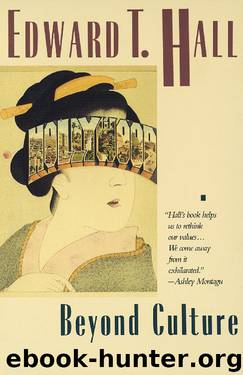Beyond Culture by Edward T. Hall

Author:Edward T. Hall [Hall, Edward T.]
Language: eng
Format: epub
Tags: Anthropology, Culture, Cultural Anthropology
ISBN: 0385124740
Goodreads: 251347
Publisher: Doubleday
Published: 1976-04-15T00:00:00+00:00
The reader, at this point, should be reminded that the division of nature into inanimate and animate and intrapsychic realms is strictly the product of Western European thinking. Other cultures carve up the universe differently.
The Hopi, for example, should have no difficulty recognizing the transactional nature of dealing with plants and animals, for they talk to their crops and their sheep and to all growing things, just as they talk to their children so that they will grow and develop properly.4 The Hopi tell us that they cannot conceive of anything growing and flourishing except with love, care, and encouragement. In addition, their use of time used to be and probably still is very, very different from that of the white man. The Europeans who inhabited the North American continent imposed their time system on everything, organic and inorganic alike. Whites have concrete notions concerning books, houses, dams, office buildings, etc., all of which have scheduled times for completion, just as children are supposed to walk and talk and go to school at certain ages. For the Hopi, every living thing has its own inherent time system; tasks concerned with man's material nonliving extensions therefore have no inherent schedule. Hence, the Hopi feel no compulsion to complete certain jobs within a specified time.
When I was working with the Hopi in the 1930s as a construction foreman, the fact that the white man had schedules for all sorts of projects that the Hopi did not, caused considerable tension. Construction projects such as dams were scheduled to be completed in a given length of time. The Hopi could not understand why they were always being needled to hurry things up and why it was that a dam should be built in any set length of time. Today, of course, some forty years later, things undoubtedly have changed. At the time I am referring to, a house could have taken twenty years to build.
Carlos Castaneda's5 Yaqui sorcerer of Sonora does not between the three categories of transactions, but lumps them all into one. To him, man cannot be separated from nature. He conducts his transactions according to an elaborate system of knowledge in which detailed information is required concerning the specific habits, attributes, and characteristics of plants, animals, and people, all of whom fall into categories that are either suitable or unsuitable for a particular person to deal with. A given individual may have to avoid one of the categories of magic, and all the plants and animals as well as the knowledge associated with that magic. Hunters relate to one cluster of living substance, while men of knowledge have another set. It is important for the Yaqui man of knowledge to control the forces in himself and the forces in nature and to balance these forces intelligently. Man has a personal relationship with everything. What one needs from life is power, but that power can be used or find its way only in certain directions, which are set by the karma of the particular individual.
Download
This site does not store any files on its server. We only index and link to content provided by other sites. Please contact the content providers to delete copyright contents if any and email us, we'll remove relevant links or contents immediately.
| ASVAB | GED |
| GRE | NCLEX |
| PRAXIS | SAT |
| See more | Flash Cards |
| Study Guides | Study Skills |
| Workbooks |
Talking to Strangers by Malcolm Gladwell(11904)
The Compound Effect by Darren Hardy(7574)
The Lover by Duras Marguerite(7131)
Wonder by R. J. Palacio(7078)
Tools of Titans by Timothy Ferriss(6963)
The Circle by Dave Eggers(6268)
A Court of Wings and Ruin by Sarah J. Maas(6106)
Kaplan MCAT General Chemistry Review by Kaplan(6062)
Deep Work by Cal Newport(5493)
To All the Boys I've Loved Before by Jenny Han(5190)
Wiseguy by Nicholas Pileggi(4598)
1,001 ASVAB Practice Questions For Dummies by Powers Rod(4044)
The Body: A Guide for Occupants by Bill Bryson(3813)
Barron's AP Biology by Goldberg M.S. Deborah T(3636)
Cracking the GRE Premium Edition with 6 Practice Tests, 2015 (Graduate School Test Preparation) by Princeton Review(3600)
ACT Math For Dummies by Zegarelli Mark(3567)
Eat That Frog! by Brian Tracy(3524)
Kaplan MCAT Organic Chemistry Review: Created for MCAT 2015 (Kaplan Test Prep) by Kaplan(3429)
Pre-Suasion: A Revolutionary Way to Influence and Persuade by Robert Cialdini(3422)
